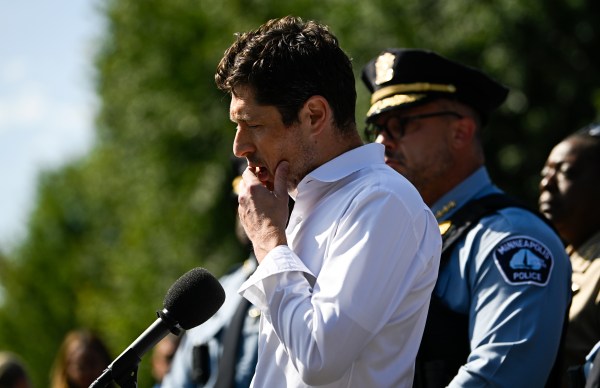Controversy erupted in right-wing circles Tuesday after the judge in Donald Trump’s classified documents case unsealed a document revealing that the FBI had been authorized to use “deadly force” in its search of Trump’s Mar-a-Lago home.
The revelation quickly gained traction online after Real Clear Investigations reporter Julie Kelly, a self-proclaimed January 6 conspiracy theorist, posted an initial screenshot of the filing. “FBI authorized the use of deadly force at Mar-a-Lago,” Kelly wrote.
According to Kelly, armed FBI agents were prepared to confront Trump and his Secret Service detail. “They were going to go door to door to terrorize [Mar-a-Lago] guests and even pick the locks. Gestapo,” Kelly wrote in a follow-up post, comparing the FBI to Nazi Germany’s secret police force.
The narrative was quickly seized upon by sympathetic conservative media figures including Mark Levin, Mollie Hemingway, Steve Bannon, Charlie Kirk, Dan Bongino, and Sean Hannity, who viewed the authorization as further proof of the Department of Justice’s unprecedented targeting of Trump.
Republican politicians have also backed Kelly’s narrative, with Rep. Marjorie Taylor Greene notably claiming that “Merrick Garland basically issued a kill order for Donald Trump,” during an appearance on OAN’s Real America with Dan Ball.
Claims that the Biden administration targeted Trump with deadly force are false. Use-of-force authorizations are a standard part of almost all FBI arrest and search warrants, and the documents authorizing the Mar-a-Lago raid used boilerplate language. The Dispatch’s Mike Warren reported these facts in a piece published Thursday:
What the defense’s filing does not detail is the fact that the operation order’s permission for law enforcement to “use deadly force when necessary” is boilerplate language included in the operations order from the DOJ’s policy on use of deadly force—the same language used in pretty much every order authorizing the execution of arrest and search warrants. This is what FBI sources told The Dispatch—that at any point where armed agents are involved in an operation, even one with no expectation of resistance such as a search warrant execution, a policy dictating when deadly force can and cannot be used is not only standard but necessary. Whether the FBI is raiding the offices of a business suspected of mail fraud, the headquarters of a drug kingpin suspected of racketeering, or the home of a former president suspected of retaining classified documents illegally, the rules governing the use of deadly force remain the same.
The FBI addressed the controversy in its own statement. “The FBI followed standard protocol in this search as we do for all search warrants, which includes a standard policy statement limiting the use of deadly force. No one ordered additional steps to be taken and there was no departure from the norm in this matter.”
On Wednesday, Fox News reporter Jacqui Heinrich confirmed that FBI searches at President Joe Biden’s homes also included use-of-force authorizations. “A person familiar with the Hur investigation confirms that the standard Department of Justice policy statement regarding the use of deadly force was also included in the operations order for the searches at President Biden’s residences in Delaware,” Heinrich wrote.
If you have a claim you would like to see us fact check, please send us an email at factcheck@thedispatch.com. If you would like to suggest a correction to this piece or any other Dispatch article, please email corrections@thedispatch.com.







Please note that we at The Dispatch hold ourselves, our work, and our commenters to a higher standard than other places on the internet. We welcome comments that foster genuine debate or discussion—including comments critical of us or our work—but responses that include ad hominem attacks on fellow Dispatch members or are intended to stoke fear and anger may be moderated.
With your membership, you only have the ability to comment on The Morning Dispatch articles. Consider upgrading to join the conversation everywhere.